News Flashes – February 2016
February, 2016
 CSPO ranked in top 10
CSPO ranked in top 10
CSPO has been ranked 10th worldwide among science and technology think tanks in the recently issued 2015 Global Go To Think Tank Index Report. “CSPO has consistently ranked highly in the index because of the great creativity and hard work of its faculty, staff and students,” said co-director Dave Guston. The 2015 report was released at the end of January with a launch that involved hundreds of think tanks and other civil society actors representing approximately 60 countries.
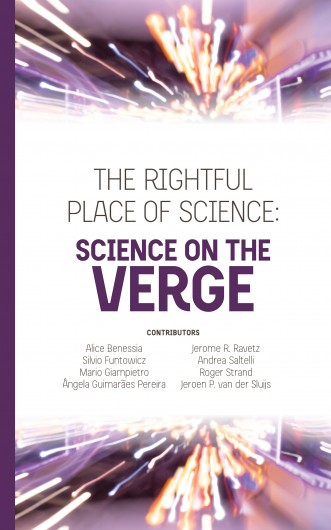
6th book in series published
“Science on the Verge,” the sixth volume in CSPO’s The Rightful Place of Science series has been released. The book explores issues surrounding the legitimacy and integrity of science and its use in policy development. The foreword by Dan Sarewitz notes that “In this book you will read about a scientific enterprise that is growing in productivity and influence even though the majority of publications in many scientific fields may be wrong. You’ll see how scientists reduce complex, unpredictable problems to much simpler, manageable models by leaving out important factors, which allows the scientists to come up with neat solutions—often to the wrong problems. You’ll learn how doing this sort of science often makes our knowledge of the world more uncertain and unpredictable, not less, and how instead of leading to ‘evidence-based policy’ we end up with ‘policy-based evidence.’”
Science on the Verge (ISBN: 978-0692596388; on sale March 2016) is available in paperback and e-book format from Amazon.com.
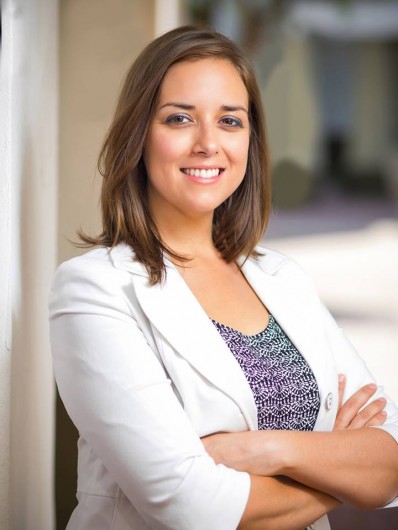
SFIS student selected for VSFS internship
Katie Curiel, an SFIS student in the Global Technologies Development (GTD) program, is one of three Sun Devils selected to work as eInterns for U.S. state department through the Virtual Student Foreign Service (VSFS). The service, established in 2009 to use technology to increase the efficacy of diplomacy, links selected applicants like Curiel with one of 21 government agencies. Not only is Curiel passionate about the work she will be doing, she also understands that she has a valuable opportunity to “extend my career interests and kind of put my foot in the door outside of education and into the field of global development.”
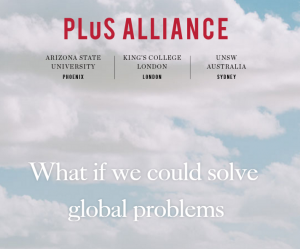 New university alliance features SFIS faculty
New university alliance features SFIS faculty
The PLuS Alliance, a three-way teaching and research alliance uniting the University of New South Wales in Australia, King’s College London, and ASU, launched on February 9th. PLuS gets underway with more than 60 jointly appointed faculty members, many of them SFIS faculty or affiliates such as Barry Bozeman, Andrew Maynard, David Guston, and ASU President Michael M. Crow. Eventually, it is hoped that PLuS will generate jointly-badged degrees for students and research-led solutions to major global challenges.
 Media turns to Andrew Maynard for commentary on Zika threat
Media turns to Andrew Maynard for commentary on Zika threat
Andrew Maynard, SFIS faculty member and director of the Risk Innovation Lab, took part in a Future Tense event in Washington, D.C. The lunchtime conversation centered on Zika as a case study in potential technical solutions to deadly diseases. While interested by the technological sophistication the strategy would employ, Maynard warned that it could bring unforeseen, possibly dangerous consequences. “What interests me is that there is this whole new technology we can use to fight disease, but this also opens up new concerns on how to use this technology.” Maynard previously commented on the use of genetically engineered mosquitoes to combat Zika virus in a State Press article and was featured on Fox 10, 12 News, and KJZZ’s “The Show” regarding the ethical issues surrounding the possible use of genetically engineered mosquitoes to combat the Zika virus. He was also quoted by the The Christian Science Monitor on the “explosion of opportunities” for regular people to contribute to scientific research.
Watch a video of the Future Tense discussion.
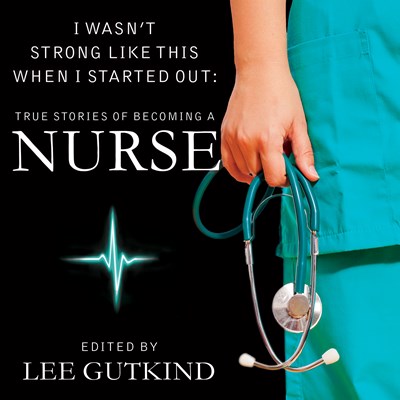
Audie Award for Lee Gutkind book
“I Wasn’t Strong Like This When I Started Out: True Stories of Becoming a Nurse” has been nominated for an Audie Award in Nonfiction, the premier distinction in audiobooks and spoken word entertainment. Narrated by Tavia Gilbert, who won an Earphones Award for her delivery, the book is an edited collection of essays by Lee Gutkind, SFIS faculty member and CSPO’s Distinguished Writer in Residence. Finalists for the awards were announced by the Audio Publisher’s Association and the winners will be revealed at the Audies Gala on May 11, 2016, at the Adler Planetarium in Chicago.
“My Climate Change”
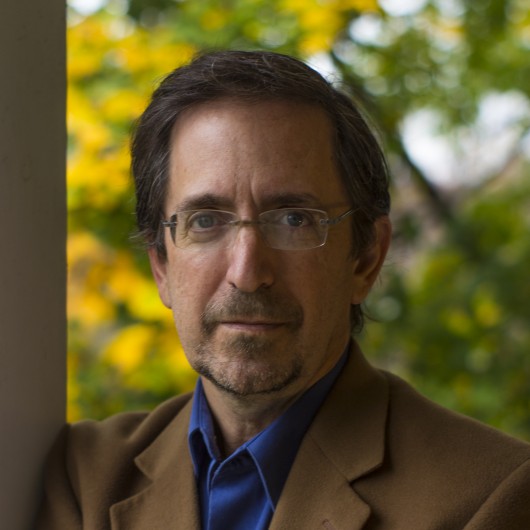 Andrew Revkin, award winning journalist and science writer for the New York Times, appeared at the Marian Koshland Science Museum on February 29th to discuss his essay, “My Climate Change,” appearing in current issues of Creative Nonfiction, co-founded by SFIS faculty member Lee Gutkind, and Issues in Science and Technology, co-edited by CSPO director Dan Sarewitz. Revkin chronicled shifts in his own outlook and challenges of writing about climate change during his thirty-year career. View recordings of part 1 and part 2.
Andrew Revkin, award winning journalist and science writer for the New York Times, appeared at the Marian Koshland Science Museum on February 29th to discuss his essay, “My Climate Change,” appearing in current issues of Creative Nonfiction, co-founded by SFIS faculty member Lee Gutkind, and Issues in Science and Technology, co-edited by CSPO director Dan Sarewitz. Revkin chronicled shifts in his own outlook and challenges of writing about climate change during his thirty-year career. View recordings of part 1 and part 2.
New internships offered by CENTSS
The Center for Engagement & Training in Science & Society, (CENTSS) is now offering museum internship opportunities for ASU students at Arizona Science Center in the form of hands on training for students preparing to begin their internship. Ryan Taylor, School of Sustainability undergrad, and Master of Science, Technology & Policy student Samantha Lloyd participated in the program under the direction of Sari Custer, Director of Educational Events and Integration at Arizona Science Center, and CENTSS Program Coordinator Jeannie Colton. This opportunity is designed to happen regularly during Spring, Fall, and Summer semesters and will be posted on Sun Devil’s CareerLink as well as several schools’ webpages.
Dave Guston featured in “How Will We Live Tomorrow”
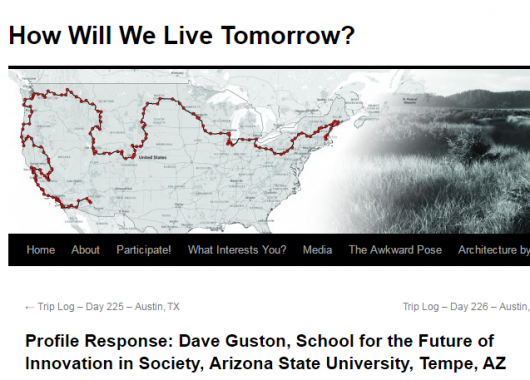 Dave Guston, CSPO co-director and SFIS founding director and faculty member, was profiled by Paul E. Fallon, a writer, architect, and yogi, and featured in the “How Will We Live Tomorrow” section of his blog. Guston emphasized the importance of democratic engagement in visioning the future: “If we can’t get pluralism right, it won’t matter whether we get the science right.”
Dave Guston, CSPO co-director and SFIS founding director and faculty member, was profiled by Paul E. Fallon, a writer, architect, and yogi, and featured in the “How Will We Live Tomorrow” section of his blog. Guston emphasized the importance of democratic engagement in visioning the future: “If we can’t get pluralism right, it won’t matter whether we get the science right.”
SFIS represented at AAAS
CSPO co-director Dan Sarewitz spoke at the American Association for the Advancement of Science (AAAS) Annual Meeting in Washington, D.C. on the complicated intermingling of science and politics, focusing on the very public disagreement between presidential science advisor John Holdren and University of Colorado political scientist Roger Pielke, Jr. Also at AAAS, SFIS faculty and Risk Innovation Lab director Andrew Maynard moderated a distinguished panel, which included Gretchen Gano, a CSPO alumna, discussing issues related to “Communicating Synthetic Biology.” Gano, now of the University of California, Berkeley, contributed a paper to the event titled, Building Civic Engagement with Biological Engineering.
Future of X Series – The Future of Oceans
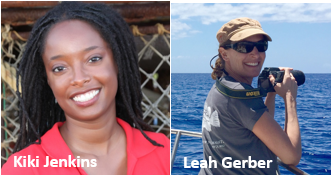
Professor Kiki Jenkins and SFIS affiliate Leah Gerber, director of ASU’s Center for Biodiversity Outcomes presented a look at the “Future of Oceans” as the latest installment in the Future of X discussion series. Jenkins and Gerber made foreboding predictions and regarding how global climate change will alter ocean composition and threaten the viability of habitats like coral reefs. Strategies for future conservation approaches were put forth based on those threats.
Future of X Series – The Future of Consciousness
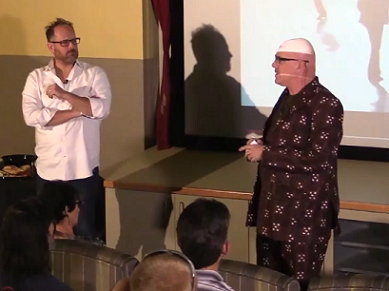
The four-part conversation series, the “Future of X”, sponsored by SFIS along with Barrett Honors College, kicked off February 15th at the Barrett Theater in the Vista del Sol Community Center. Gregg Pascal Zachary of SFIS and SHPRS assistant professor Gaymon Bennett spoke together about the Future of Consciousness. Whether in the form of “brain-pills,” artificial intelligence, or digital technology, science and technology are poised to transform the future of the human experience into a form some are already calling “superconsciousness.”
View a recording of the discussion.
After Paris: Energy, Carbon and Society in Global Transition
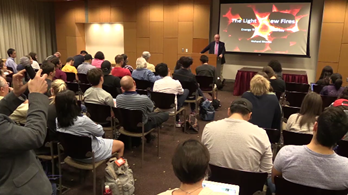
SFIS presented the “After Paris: Energy, Carbon and Society in Global Transition” energy symposium featuring two dynamic speakers on February 23. Stephanie LeMenager’s talk, Zombie Fuel was on living oil, casting the modern energy system and aspirations for a renewable future. Richard Rhodes’ talk, “The Light of New Fires” focused on energy challenges of yesterday, today and tomorrow.
Publications
HSD candidate Shane Kula wrote an article commenting on the controversy surrounding “three-parent children” — children born by combining the DNA from two mothers and one father using in-vitro technique called mitochondrial manipulation technologies. The article is part of Future Tense and links to it can also be found via Kula’s twitter handle, @UnForge.
CSPO affiliate Manjana Milkoreit contributed a chapter titled, “The Promise of Climate Fiction – Imagination, Storytelling and the Politics of the Future” to Reimagining Climate Change, a book concerned with the failures of the climate change response industry.